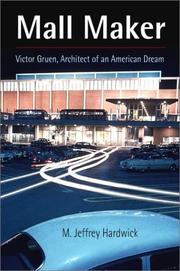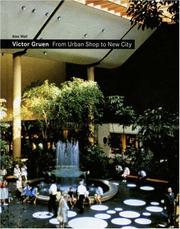| Listing 1 - 10 of 19 | << page >> |
Sort by
|
Book
ISBN: 1555908357 Year: 1988 Publisher: Monticello (Ill.): Vance bibliographies
Abstract | Keywords | Export | Availability | Bookmark
 Loading...
Loading...Choose an application
- Reference Manager
- EndNote
- RefWorks (Direct export to RefWorks)
Book
Abstract | Keywords | Export | Availability | Bookmark
 Loading...
Loading...Choose an application
- Reference Manager
- EndNote
- RefWorks (Direct export to RefWorks)
Book
Year: 1981 Publisher: Tokyo : A.D.A. EDITA Tokyo Co., Ltd.,
Abstract | Keywords | Export | Availability | Bookmark
 Loading...
Loading...Choose an application
- Reference Manager
- EndNote
- RefWorks (Direct export to RefWorks)
Gruen --- Pelli, C. --- Ver. Staten van Amerika --- Pelli, Cesar

ISBN: 0812237625 Year: 2004 Publisher: Philadelphia (Pa.) University of Pennsylvania press
Abstract | Keywords | Export | Availability | Bookmark
 Loading...
Loading...Choose an application
- Reference Manager
- EndNote
- RefWorks (Direct export to RefWorks)
Architects --- Expatriate architects --- Shopping malls --- Stores, Retail --- History --- Gruen, Victor,

ISBN: 8495951878 9788495951878 Year: 2005 Publisher: Barcelona Actar
Abstract | Keywords | Export | Availability | Bookmark
 Loading...
Loading...Choose an application
- Reference Manager
- EndNote
- RefWorks (Direct export to RefWorks)
Victor Gruen is the commercial architect who became renowned in 1950s America as the "pioneer of the shopping center," then by his urban redevelopment projects as the "savior of the downtowns," and by the mid-1960s as the "architect of the environment." From Urban Shops to New City focuses on Gruen's theories and projects, especially with respect to the terms that he set for himself: the return of the city center and urban public space as the focus of the social and cultural life of the region. The context of his vision, however, was the "triumph" of the suburbs and the collapse of the American downtowns. Gruen's successes and failures engaged or prefigured every important commercial retail development, and planning trend since World War II; thus his work is a crucial vehicle for understanding the transformation of American cityscape and landscape, and is a starting point for asking the questions: What kind of city do we want?
Gruen, Victor --- Victor Gruen (Grünbaum) 1903-1980 (° Wenen, Oostenrijk) emigreerde in 1938 naar de VS --- Stedenbouw architectuur 1950-1980 Victor Gruen --- Stedenbouw Verenigde Staten 2de h. 20ste eeuw --- Buitenwijken --- Stedenbouw periferie uitdijende voorsteden --- Stedenbouw denken over winkelen shopping centers --- 72.07 --- 712.07 --- Architecten. Stedenbouwkundigen A - Z --- Landschaps- en tuinarchitectuur tuin- en landschapsarchitecten (A - Z) --- Shopping centers --- Centres commerciaux --- History --- Histoire --- Gruen, Victor, --- Victor Gruen (Grünbaum) 1903-1980 (° Wenen, Oostenrijk) ; emigreerde in 1938 naar de VS --- Stedenbouw ; architectuur ; 1950-1980 ; Victor Gruen --- Stedenbouw ; Verenigde Staten ; 2de h. 20ste eeuw --- Stedenbouw ; periferie ; uitdijende voorsteden --- Stedenbouw ; denken over ; winkelen ; shopping centers --- Landschaps- en tuinarchitectuur ; tuin- en landschapsarchitecten (A - Z) --- stores --- interior architecture [discipline] --- urban development --- Environmental planning --- Architecture --- Housekeeping --- Economics --- Commerce de détail --- Constructions commerciales --- Architectes --- Urbanisme --- Critique et interprétation --- History. --- Critique et interprétation. --- Commerce de détail --- Critique et interprétation. --- stores [built works]
Book
ISBN: 9781517902094 9781517902100 1517902096 151790210X Year: 2017 Publisher: Minneapolis: University of Minnesota press,
Abstract | Keywords | Export | Availability | Bookmark
 Loading...
Loading...Choose an application
- Reference Manager
- EndNote
- RefWorks (Direct export to RefWorks)
Victor Gruen was one of the twentieth century's most influential architects and is regarded as the father of the U.S. shopping mall. In spring 1979, less than a year before his death, he began reconstructing his life story. Now available in English for the first time, Shopping Town is the long overdue account of a man whose work fundamentally altered the course of city development. Shopping Town opens in Vienna in 1938 with the Anschluss--the turning point in Gruen's life--as he narrowly escaped the Nazi regime. A few years later, in the suburbs of postwar America, the Jewish refugee sought to reproduce the vitality of Vienna's city center and invented the commercial apparatus now known as the shopping mall. Gruen's Southdale Mall in Edina, Minnesota, was the first fully enclosed shopping center in America. He then translated the concept to economically neglected city centers, setting the path for pedestrian zones and fighting passionately for an urban ideal without compromise. Highlighting Gruen's sense of humor as well as reflections on the complex forces that sustained the postwar transformation of American cities, Shopping Town embeds Gruen's experiences and perspectives in a wider social and political context while helping us understand his problematic place in American architectural culture. With afterwords by his son and daughter, Shopping Town closes with Anette Baldauf's richly insightful essay on the legacy of Victor Gruen
Environmental planning --- urban planning --- Gruen, Victor --- United States --- Expatriate architects --- Architects --- Stores, Retail --- Shopping malls --- City planners --- Town planners --- Urbanists --- Malls, Pedestrian --- Malls, Shopping --- Retail stores --- Shops --- History --- Gruen, Victor, --- Grünbaum, Victor David, --- Gruenbaum, Victor, --- Planners --- Professional employees --- Pedestrian areas --- Retail trade --- Shopping centers --- Arcades --- Commercial buildings --- Expatriate architects - United States - Biography --- Architects - Austria - Biography --- Stores, Retail - United States - History - 20th century --- Shopping malls - United States - History - 20th century --- City planners - Austria - Biography --- Gruen, Victor, - 1903-1980 --- United States of America
Book
ISBN: 2281150658 Year: 1982 Publisher: Paris : Éditions du Moniteur,
Abstract | Keywords | Export | Availability | Bookmark
 Loading...
Loading...Choose an application
- Reference Manager
- EndNote
- RefWorks (Direct export to RefWorks)
Book
ISBN: 9789462085244 9462085242 9789462085626 Year: 2019 Publisher: Rotterdam: nai010,
Abstract | Keywords | Export | Availability | Bookmark
 Loading...
Loading...Choose an application
- Reference Manager
- EndNote
- RefWorks (Direct export to RefWorks)
L'architecture narrative révèle un flot de visions architecturales et urbaines remarquables au XXe siècle qui ont abouti à la construction de l'une des armes les plus puissantes, mal comprises et sous-utilisées de la critique, de la pensée et de la représentation architecturales et urbaines. Cette généalogie historique en trois parties tisse une architecture moderne inséparable et une critique narrative à travers des images inédites d'un demi-siècle de projets utopiques, héroïques, commerciaux, ironiques et critiques de Le Corbusier, Team 10, Constant, Victor Gruen, Yona Friedman, Archizoom, Superstudio et Rem Koolhaas. Narrative Architecture' reveals a stream of remarkable architectural and urban visions in the twentieth century that culminated in the construction of one of the most powerful, misunderstood and underutilized weapons of architectural and urban critique, thinking and representation. This historical genealogy in three parts weaves inseparable modern architecture and narrative critique through never before seen images of half a century of utopian, heroic, commercial, ironic and critical projects by Le Corbusier, Team 10, Constant, Victor Gruen, Yona Friedman, Archizoom, Superstudio and Rem Koolhaas. Alluding to Diogenes, the ancient kynic who wandered with a lantern in search of an honest man, through narrative, archival and provocative images and texts, the book lays the groundwork in search of an honest architecture able to question the pressing challenges of our times.
72.049 --- 72.038 --- 72.07 --- 741:72 --- Cruz Garcia & Nathalie Frankowski --- Architectuurtheorie ; stedenbouw ; 20ste eeuw --- Steden ; architectuur ; utopische --- Visionaire architectuur en stedenbouw --- Architectuur ; verschillende onderwerpen --- Architectuurgeschiedenis ; 1950 - 2000 --- Architecten. Stedenbouwkundigen --- Tekenkunst ; architectuurtekeningen --- Architecture, Modern --- Visionary architecture --- Architecture --- Critical theory --- Idéologie --- Politique de l'architecture --- Critique architecturale --- Utopie architecturale --- Situationnisme --- Mouvement moderne --- Team ten --- Political aspects --- Le Corbusier, Charles-Edouard Jeanneret, --- Constant --- Gruen, Victor, --- Friedman, Yona, --- Koolhaas, Rem, --- Archizoom --- Superstudio --- History of civilization --- utopias --- visionary architecture --- Modern Movement --- Architecture, Modern - 20th century --- Architecture - Political aspects --- Le Corbusier, Charles-Edouard Jeanneret, 1887-1965 --- Gruen, Victor, 1903-1980 --- Friedman, Yona, 1923-2019 --- Koolhaas, Rem, 1944 --- -Architecture --- -72.049 --- -Idéologie --- Koolhaas, Rem, 1944-
Book
ISBN: 963386447X 9633864488 9789633864487 9789633864470 Year: 2022 Publisher: Central European University Press
Abstract | Keywords | Export | Availability | Bookmark
 Loading...
Loading...Choose an application
- Reference Manager
- EndNote
- RefWorks (Direct export to RefWorks)
"The Hungarian artist-designer László Moholy-Nagy, the Austrian sociologist Paul Lazarsfeld, and his fellow Viennese Victor Gruen-an architect and urban planner-made careers in different fields. Yet they shared common socialist politics, Jewish backgrounds, and experience as refugees from the Nazis. This book tells the story of their intellectual migration from Central Europe to the United States, beginning with the collapse of the Habsburg Empire, and moving through the heady years of newly independent social-democratic republics before the descent into fascism. It follows their experience of exile and adaptation in a new country, and culminates with a surprising outcome of socialist thinking: the opening of the first fully enclosed, air-conditioned suburban shopping center in the United States. Although the American culture they encountered ostensibly celebrated entrepreneurial individualism and capitalistic "free enterprise," Moholy-Nagy, Lazarsfeld, and Gruen arrived at a time of the progressive economic reforms of the New Deal and an extraordinary open-mindedness about social democracy. This period of unprecedented economic experimentation nurtured a business climate that, for the most part, did not stifle the emigres' socialist idealism but rather channeled it as the source of creative solutions to the practical problems of industrial design, urban planning, and consumer behavior. Based on a vast array of original sources, Malherek interweaves the biographies of these three remarkable personalities and those of their wives, colleagues, and friends with whom they collaborated on innovative projects that would shape the material environment and consumer culture of their adopted home. The result is a narrative of immigration and adaptation that challenges the crude binary of capitalism and socialism with a story of creative economic hybridization"--
Capitalism --- Socialism --- Gruen, Victor, --- Lazarsfeld, Paul F., --- Moholy-Nagy, László, --- Moholy-Nagy, Ladislaus, --- Nagy, László Moholy-, --- Nagy, Ladislaus Moholy-, --- Lazarsfeld, Paul Felix --- Grünbaum, Victor David, --- Gruenbaum, Victor, --- United States --- Intellectual life --- Social conditions. --- capitalism, socialism, immigration, business, design
Book
Year: 2008 Publisher: Parijs Cercle d'Art
Abstract | Keywords | Export | Availability | Bookmark
 Loading...
Loading...Choose an application
- Reference Manager
- EndNote
- RefWorks (Direct export to RefWorks)
Art --- energy --- light [energy] --- motion --- techniques [processes] --- kunst en technologie --- Fluxus --- Tinguely, Jean --- Paik, Nam June --- Caillebotte, Gustave --- Parreno, Philippe --- Duchamp, Marcel --- Augustin, Stephan --- Berthier, Julien --- Briand, Mathieu --- Copeland, Sebastian --- Gruen, Victor --- Hubert, Pierre-Alain --- Kac, Eduardo --- Krakowiak, Beata --- Delvoye, Wim --- Beuys, Joseph --- Peinado, Bruno --- Boltanski, Christian --- Penone, Giuseppe --- Klein, Yves --- Kowalski, Piotr --- Marc, Franz --- Picabia, Francis --- Boccioni, Umberto --- Braque, Georges --- Merz, Mario --- Rauschenberg, Robert --- Dufy, Raoul --- Schöffer, Nicolas --- Agam, Yaakov --- Eliasson, Olafur --- Anselmo, Giovanni --- Turrell, James --- Flavin, Dan --- Kounellis, Jannis --- Mori, Mariko --- Nauman, Bruce --- Karavan, Dani --- Orlan --- Fend, Peter --- Verjux, Michel --- Raysse, Martial --- Calder, Alexander --- Chaos Computer Club
| Listing 1 - 10 of 19 | << page >> |
Sort by
|

 Search
Search Feedback
Feedback About UniCat
About UniCat  Help
Help News
News